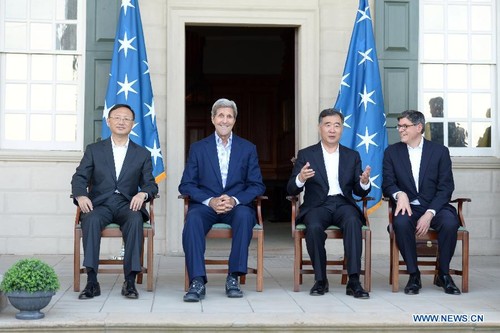(VOVworld) – The 7th annual US-China Strategic and Economic Dialogue has convened in Washington DC, the US, amidst sharp tensions over cyber security, regional trade, and China’s illegal activities in the East Sea. The Dialogue is likely to disappoint expectations due to the wide differences between the two sides.
 |
| (L to R) Chinese State Councilor Yang Jiechi, U.S. Secretary of State John Kerry, Chinese Vice Premier Wang Yang, and U.S. Treasury Secretary Jacob Lew pose for photos at Mount Vernon, the home of first U.S. President George Washington, in Virginia, the United States, on June 22, 2015. (Xinhua/Yin Bogu) |
The Dialogue is being co-chaired by US Secretary of State John Kerry, US Treasury Secretary Jacob Lew, Chinese Vice Premier Wang Yang, and State Councilor Yang Jiechi in Washington on June 23-24.
The East Sea in US-China relations
US Assistant Secretary of State for East Asian and Pacific Affairs Daniel Russel said the East Sea is a key item on the agenda of the Dialogue. The US will question the purpose of China’s man-made islands in the East Sea, an issue China has tried to avoid. The US made its stance clear at the Shangri-La Dialogue in Singapore last month, where US Secretary of Defense Ashton Carter pointedly requested the cancellation of all construction activities in the East Sea, particularly China’s land reclamation and building of artificial islands.
The US is concerned that from these artificial islands, China can enforce restrictions on foreign ships and airplanes in the East Sea, threatening international freedom of navigation and increasing tensions.
China has made no response to the US request, but has repeatedly protested US intervention in East Sea issues. The 7th US-China Strategic and Economic Dialogue will be a test of both sides.
Differences over economic and cyber security issues
Besides tensions over the East Sea, the new US-China relationship is clouded by mistrust over cyber security and democracy in Hongkong. Revelations by former NSA contractor Edward Snowden of US espionage ignited reciprocal accusations between the US and China. The matter peaked when the US prosecuted 5 Chinese officials for hacking US computers. China denied all charges of computer intrusion and didn’t reply to a US proposal to resume a cyber security dialogue.
Beijing and Washington are both facing economic difficulties. Since last summer the US has lobbied its allies to boycott China's Asian Infrastructure Investment Bank, which is seen as a competitor of western institutions like the IMF.
Efforts to narrow differences
Despite the gloomy atmosphere leading up to the Dialogue, the US and China have persuasive reasons to cooperate in their mutual interest. Both countries hope to break an impasse blocking the US-China Bilateral Investment pact. Once it is signed, China can increase investments in the US, and the US can ease its unemployment rate.
They expect to narrow differences in security and politics through diplomacy. The sixth round of High-Level Consultation on People-to-People Exchange will be hosted by US Secretary of State John Kerry and Chinese Vice Premier Liu Yandong. They will exchange measures to boost relations in education, culture, science, sports, healthcare, and women’s issues.
Experts predict that despite a clear agenda, the Dialogue’s outcomes will be modest.